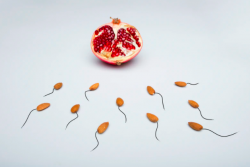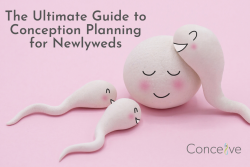The team of Naturopathic Doctors at Conceive Health tests for insulin resistance with every single patient.
The main tests we want to see are:
- fasting insulin
- fasting glucose
These 2 numbers are used to calculate a ratio called a HOMA-IR score, which is used in the research to compare cases. You will see a lot of research looking at HOMA-IR and PCOS, HOMA-IR and pregnancy loss, and HOMA-IR and fertility.
Sometimes we’ll also want to see a 2 or 3-hour oral glucose tolerance test, which involves more time at the lab but gives a much more nuanced view of how the body is responding to carbohydrates and could capture more insulin resistance cases when the initial tests (as above) are normal.
Insulin resistance and inflammation:
When Naturopathic Doctors test for insulin resistance, we also test a marker called CRP (C-Reactive Protein). This is a marker of inflammation in the body. It is non-specific, meaning it doesn’t tell us *where* the inflammation is coming from, but I find it correlates most closely to insulin resistance. Patients whose bodies and hormones are having exaggerated responses to insulin, like most patients with PCOS, very often have higher levels of inflammation that can negatively affect egg quality.
Inflammation and insulin resistance also have negative effects on sperm quality and it is recommended to test both partners (if applicable).
Insulin resistance and body weight:
Insulin is a hormone that tells the body to store fat. So when insulin is HIGH, it is very hard to lose weight. Patients with PCOS often have elevated insulin as part of their picture, but it can’t be assumed based on a patient’s body composition alone and needs to be tested. This is why it’s frustrating to have higher BMI PCOS patients simply be told they “need to lose weight” in order to support their fertility. It’s not that simple. Their hormones are what can get in the way of losing weight in the first place.
Weight itself is not the key indicator of a person’s fertility, but their hormones (like insulin) are! Patients need to be supported properly from the hormonal side, as the main treatment outcome to improve fertility.
Symptoms of insulin resistance:
When insulin is too high (found on simple bloodwork), it is involved with:
- acne
- skin tags
- hair loss
- menorrhagia (heavy periods)
- fibroids
- anovulation/ low progesterone
- miscarriage
- anxiety/depression
- insomnia
- hypothyroidism
- NAFLD (non-alcoholic fatty liver disease)
- vertigo
- and more!
Insulin and hormone dysregulation:
Insulin, if it is high in the body (found through simple bloodwork), can impact several hormones that relate to fertility.
- testosterone
- DHT
- estrogen
- cholesterol
- inflammation
What will affect insulin levels for fertility?
Things that will push insulin to be higher than we want for fertility are also the tools we can use to help regulate it.
- Diet / Exercise
- Genetics
- Gut microbiome
- Liver health/ Bile acids
- Stress / Sleep
- Circadian Rhythm
Dietary habits that will aggravate insulin resistance:
- High saturated fat, high sugar diets
- Yoyo dieting
- Low nutrient, low fibre, highly processed foods
- The fibre component is very important!
Fibre for insulin resistance:
- One of the most cost-effective things to add for blood sugar balance and insulin control is fibre.
- The research recommends getting 25-35gr of fibre per day. To see how much you’re currently getting, you could try tracking for 3-5 days with a free app like myfitnesspal or chronometer.
- If you’re short on fibre, use something like inulin or psyllium husk to slowly increase your intake by 1 tsp at a time until you’re up to 1-2 tbsp. Drink an extra glass of water when you add fibre and watch for bloating or issues with bowel movements as signs to slow down. Your body may need to adjust to the extra fibre.
- Fibre is fantastic for hormone regulation like estrogen as well. I highly recommend aiming for 25-35gr per day regardless of where you are on your fertility journey.
Polyphenols for PCOS:
- Polyphenols are a type of compound found in plants – fruit, vegetables, and herbs. Often polyphenols are what give a plant its colour, like orange, red, purple etc.
- Polyphenols include compounds you may have heard of like quercetin (largely found in onions and apples), EGCG (in green tea), and resveratrol (grape skins).
- Whole food sources offer the broadest amount of polyphenols. Some examples of foods highest in polyphenols are:
- black elderberry
- black currant
- blueberry
- hazelnut
- pecan
- plum
- cherry
- globe artichoke heads
- blackberry
- strawberry
- coffee
- almond
- The research shows benefit to PCOS patients at a serving size of approx 2.5 cups per day of a variety of these foods (and a much longer list of course!)
Research shows polyphenols can help PCOS patients with:
- Anti-inflammatory effects
- Antioxidant effects
- Change bacterial populations within the gut
- May reduce the insulin/ glucose response to a high carb meal
- Lower glucose, insulin, HOMA-IR, and CRP
PMID: 24314860, 29993262, 26742071, 22749178
If you have questions, please drop us a line at info@conceivehealth.com or book an appointment online at https://conceive.janeapp.com/










